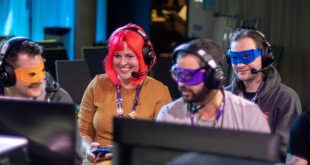In this Autism Awareness Month, Amiqus’ Liz Prince talks to Autistica’s Corporate Partnership Office about the organisation, its Autistica Play initiative and what studios can do to welcome neurodiverse individuals
Tell us more about Autistica and, more specifically, Autistica Play.
Autistica is the UK’s leading autism research charity. Our vision is a world where every autistic person lives a happy, healthy,
long life.
Games can be a real lifeline for autistic people, who play games to have fun, relax, connect with others and build skills. According to the Ukie Games Industry Census 2022, the games industry has more neurodivergent people working within it than the working age population. Overall, 18 per cent of respondents reported having at least one neurodevelopmental condition.
It’s clear that autistic people are inspired to both play and make games. We built the Autistica Play initiative to connect with the games industry and gamers, so that together we can continue to make progress for autistic people. Through annual events, partnerships and in-game activities, we aim to raise vital funds and awareness for autism research and campaigning in games.
How do you work with studios in the industry – and what are your goals within the industry when it comes to a) neurodiverse games professionals and b) neurodiverse gamers?
Autistica Play partners with studios who are keen to develop meaningful collaborations to champion autistic people in games. We support studios to embrace neurodiversity in the workplace, attract autistic talent and demonstrate their commitment to social purpose.
Autistica was one of the chosen charities for Jingle Jam 2021 through which the gaming community raised a staggering £274,000. With this funding we are launching the Games Innovation Fund, a world’s first initiative that will research the impact of gaming on autistic children’s lives. The fund will also create evidence-based ways that games can support autistic children’s learning and development.
It’s hugely inspiring to see how welcoming the games industry is to autistic people. We also want to ensure that neurodivergent games professionals have the support they need throughout their working life to ensure both recruitment and retention practices are truly inclusive and accessible. It’s also essential that neurodivergent gamers have access to the adjustments they deserve to ensure they can thrive whilst gaming and community building.
Why should more games studios look to hire more neurodiverse individuals? What can they bring to a studio and a team?
Neurodivergent people perceive and experience the world around them in unique ways, which means they offer exciting perspectives in both creative and technical roles, a combination that frequently comes together in games industry job opportunities. With many games studios currently experiencing recruitment challenges, it’s more important than ever for studios to differentiate themselves and showcase they’re a welcoming and accessible workplace for any neurodivergent employee.
By hiring more neurodivergent people, games studios can also benefit from skills like innovative problem solving and the ability to resist ‘herd mentality’.
What adjustments should studios make in the recruitment process? And what should studios do to make their workplaces more welcoming to neurodiverse individuals?
Adjustments allow neurodivergent people to be as effective and authentic as possible throughout the recruitment process and their working lives. Simple adjustments are also a great way to create welcoming workplaces for everyone.
Every person’s needs are unique, so adjustments will vary from person to person. This highlights the importance of flexibility and good communication from recruiters, as not all neurodivergent people will feel confident in disclosing a diagnosis or their required adjustments for fear of discrimination. Studios need to be proactive in offering adjustments and open dialogue, rather than placing the responsibility on the applicant.
It is also important to acknowledge that adjustments work towards different outcomes. Some adjustments are aimed at minimising distractions (eg, using noise cancelling headphones if people have sensitivity to noise), while others help to enhance focus (eg, maintaining a weekly planner utilising task management apps).
Awareness of the adjustments’ intended outcomes will help to increase their effectiveness for autistic and neurodivergent employees and their employers.
The recent Ukie Census revealed that 10 per cent of industry professionals report having ADHD or similar, and four per cent Autism, which is higher than in the national adult population. Why do you think that more neurodiverse individuals are attracted to a career in games?
It was brilliant to see the Ukie Games Industry Census 2022 shine a light on the diversity present within games, showcasing both areas for improvement and celebration. We are delighted to have such strong neurodivergent representation within the industry and the question of why this might be is an interesting one.
As far as we’re aware, there is no evidence that provides a clear-cut answer. Online gaming can enable social interaction, decrease isolation, build skills and offer forms of expression for neurodivergent people who may experience difficulties with in-person interactions. It is possible that because of the positive experiences playing games can provide, autistic people have an affinity for making those games come to life.

 MCV/DEVELOP News, events, research and jobs from the games industry
MCV/DEVELOP News, events, research and jobs from the games industry




